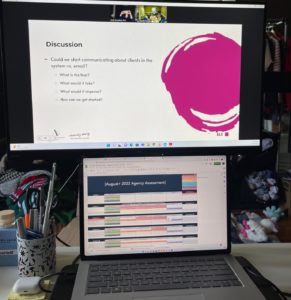Introduction to Insurance Agency Reports
Do insurance agency reports make you nuts? If it does, you are not alone. For many insurance agency owners, reporting is a bit overwhelming and frustrating. For this reason, many agency owners shy away from using reports from their agency management systems. What this means is, owners either require their team to duplicate entries and use a spreadsheet, or they operate the agency based mainly on feelings. Both strategies are bandaids for embracing the suck of getting your agency management system reports accurate!
In this blog, we will break down the common reasons your reports are not accurate as well as the top six reports we always look at in our agency assessment process.

APP Update Section
Where we were last week:
Kelly: Blue Ridge, GA
Heath: Blue Ridge, GA & San Diego



Common Reasons Your Agency Management System Reports Are Inaccurate
You have probably been in this situation. You want to see a metric on your agency. So you pull up your agency management system and run insurance report. When you see the result, you know it’s not right, you get frustrated and move on to something else that makes way more sense. Ever been in that position?
If you have been there, welcome to the club. Most insurance agency owners have had this experience!
Where we all get it wrong is the giving up part. Instead, we need to embrace the suck and figure out how to make it right. What’s the alternative? Keep duplicating efforts, or run the business without reporting? I think not!

4 Reasons Management System Reports Are Inaccurate
Let’s dish! Here are the top four common challenges we see with insurance reports and how to fix it.
- Data Entry: When everyone on the team is doing a different process or procedure, you can bet your reports are inaccurate. For many agencies, personal lines and commercial lines can follow wildly different processes. This will also make reporting more difficult. While the teams have different processes, they can follow some basic similar workflows. The solution: document your processes and audit them to ensure data integrity!
- Download: We are big supporters of both personal and commercial downloads (yes, commercial too! But that is a topic for a whole different blog). However, every company and system handles downloads differently. You have to understand each company and how the download works and then build your workflows accordingly.
- Reporting Setup: When you are building reports, it’s important to understand how delicate reporting really is. You need to be intentional on how you set up the date range, fields, and intent of the report. When running reports, it is critical you understand how the report is built. We recommend that you always review reporting documentation. Something to consider is making sure you are grabbing the correct fields. For example, there is a big difference between premium and annualized premium.
- Understanding the Report Intent: From time to time, we see confusion on what the report is asking for. A great example of this is the book of business report. This report is often misunderstood as it is a picture of the agency at that time—it changes every moment! You will never get the report the same way a second time.
So now that we have the common challenges, let’s dive into what to do about it!
Poor data management can lead to overpaid commissions, poor time management, employee stress, unsuccessful marketing campaigns and failed third-party integrations. Accurate data leads to successful agency planning. Knowing where the client and policy came from will allow for better target marketing. Proper assignment of clients and policies will show the book size managed by each CSR. Verifying phone numbers and emails, then assigning them to the correct client will ensure that you can get ahold of them in the event of an urgent matter and that third-party integrations connect correctly. Start small and build from there. Create a weekly or monthly schedule to review your data for accuracy, then stick to it.
Stephen Harrington, The Diva of Insurance
How to Embrace Your Insurance Reports
We know the importance of getting your insurance correct. Let’s discuss some ways to help you along in the process!
- Join Your Management System User Group: For a relatively small investment, your agency can join your management system’s user group. This is a great resource to network with other users and ask questions. They also have specialized content for members. In addition, they have product upgrades that your agency can use to stay current.
- Use Support, Knowledge Bases, and Other Resources: You will need to stay current on your management systems. Use their support line to ask questions and read and/or watch videos to understand how to best utilize your management system.
- Find a Management System Trainer: Many systems have trainers who work for the management system or they own their own training firm. This is the fastest and best way to get your reporting accurate. While this can be an expensive investment, having access to the data will always pay you dividends in making sound business decisions.
- Agency School: Our agency school has management system guides (step-by-step PDFs and videos) for Applied Epic, Vertafore AMS360, and Hawksoft. This is a great solution if you need some guidance but are happy to do it yourself.
“At first, I was reluctant to share our agency metrics with managers and staff. Fortunately, It’s been one of the best decisions we have made. Staff members from processing to management now work to hit goals, stay current with their activities and work load and are working better together as teams. Everyone strives to watch the quarterly bonus pools increase and get excited when it’s time to reap the reward. We have worked as a team to clean up data and make sure all new data is input properly and trackable.”
Cindy Winn, Widener Insurance
Activity Insurance Report

The activity report is rich with information! This insurance report (when everyone is logging activities uniformly) can tell you what everyone is doing, if they are logging accurately, and where time is going. The activity report is usually run for the last week and when you export it to Excel, you can see a clear picture of what your team has been doing. Here is how we use the activity report:
- Total Weekly Activities: Are they up or down? (use this to predict burnout)
- Activities by Person: This will show you who hustled and who slacked.
- Top Activity Code: This will show you if your team is following their job descriptions and handling the work that they should be! (Most systems have a way to label or code the activity)
- Top Client Activities: You can filter to find which clients are being worked the most. You may notice your team over-servicing lower-level accounts!
This report is so valuable, and when displayed routinely, you can really show your team areas for improvement. Showing them the data makes it not personal but instead about the facts. We have a saying, “If it’s not in the management system, it didn’t happen!” Installing that belief in your agency will help ensure your data is on track.
Overdue Activity Report
Once you get your team using your agency management system uniformly, this insurance report is certainly very helpful. This report will show you the current backlog for each team member. We love this insurance report as part of our Agency Efficiency program. At APP, we define overdue as anything that had a due date of yesterday. We know some agencies give a grace period, but we preach that the team has to become comfortable raising their hand if they are backlogged, and most importantly, accept help from agency leadership as it’s offered. Too often, agency team members don’t feel comfortable asking for help or only want help in a very narrow and specific way. In order to thrive, every team member needs to embrace the idea that asking for help is a sign of courage, not weakness.
From the overdue activity report, we can get the following information:
- Overdue Activities by Team Member: This will show you who is backlogged and who needs help. Once everyone is using activities uniformly, leadership can see clearly who needs help. We can also see those who are not great at managing their activities to provide some extra training (or retraining).
- Overdue Activities by Code: From this report, we can see which activities we are consistently deprioritizing. Unfortunately, many of these activities can be the most valuable. It’s frequent that quote follow-ups, renewal reviews, and processing are first to get deprioritized.
- Average Backlog: This one may take some Excel handywork, but if you are skilled, you can calculate the average number of days the team is backlogged. It’s not uncommon that we see teams backlogged for 30+ days. What this means is that the average task is 30 days overdue. This indicates that the team is not using your system as intended. It’s also a great thing to celebrate when they get that metric down to under two days!
The overdue activity report is a great warning signal for leadership to address any backlog before it gets too crazy.
Lost Policy Report
Quite a lot can be learned by looking at why your clients are leaving and where they are going. When the team is instructed on how to use lost policy reasons, you, as the owner, can launch strategies designed to save at-risk accounts. When you share the lost policy report publicly, you start to see the team really fighting to save clients who are on the cusp of leaving.
When it comes to the lost policy report, here is what we look at during the agency assessment process:
- Total Policies, Premiums, and Revenue Lost: We want to see what is leaving the agency.
- List of lost policies with customer name and premium: It’s pretty powerful when every month you are looking at a list of clients leaving your agency and the premium it represents. Rather than just look at numbers, it’s valuable to look at the name of each client.
- Lost Policies by Carrier: We review this by premium, count, and revenue. This will clearly show you where your book is shrinking with some carriers.
- Lost Policy by Type: Certain types of policies may have higher churn. For example, auto tends to be the most volatile. This will help your agency identify which policies need cross selling for longevity.
- Lost Policy Reason: Now some of you may think your team won’t code these accurately, but you may be wrong. Also, if they are coding everything inaccurately, you have a culture—not a reporting—problem. When we set up agencies with lost policy reasons, we take off “price.” We do have a “price with a remarketing” or “price no remarket.” Price is often the thing that clients present as the reason, but very often, it’s relationship. Also, you may find that “non-payment” or “people-selling” is your top reason. This allows you to hyperfocus on the right strategy to keep retention high.
One note on the lost policy report, this report and your agency’s new business report must be accurate in order to establish a true retention report. Any discrepancies in these two reports will impact retention. This is why it is also critical your team is aware of how to code remarkets and that you audit that process based on your management system.
New Business Report
Everyone loves new business, right? But too many insurance agencies use the side hustle spreadsheet to track new business rather than work to make sure the management system is accurate. With new business, here are the metrics we like to review as part of our agency assessment.
- New Policy Count, Premiums, and Revenue: This is a great general report just to see how much you are selling. It’s great to compare against the lost policy report. You always want to be selling more policies, premiums, and revenue than you are losing.
- New Business by Sales Agent: You will want to show this by count, premiums, and revenue. We recommend that you actually rank the producers so it’s clear who is succeeding and who is not. Remember, numbers do not have feelings, in sales, the facts are the facts!
- New Business by Source: Knowing how your team is getting opportunities is critical. When it comes to spending your marketing money, you want to track your new business sources to fuel future success.
- New Business Carriers: Every agency should have a core carrier list that you should be actively trying to place business with. This report is a great way to catch when your team starts placing business with non-core carriers.
Retention Report
This report is probably the trickiest to get right. It requires the rest of these reports to be spot on. However, it is worth it to get it right. Retention is where the money is. You want to be able to track retention.
We like to look at retention with the following filters:
- Policy Count
- Premium
- Revenue
- Department
- Account Manager
- Producer
- Policy Type
- Carrier
What you will find with retention is that each number will give you a clue to look into more detail. Many agencies can get frustrated and don’t trust retention metrics. We actually recommend you work on these reports in the order provided, easiest to hardest. With each report you will clean up reports and processes as part of the process.
Conclusion
Reporting is hard but necessary. It’s a good thing we can do hard things! We recommend you partner up to help get your agency reports accurate. The only way reports will make an impact on your agency is if you consistently review them both with leadership and the team.
When you roll out new metrics to the team, it will take them a few months to understand the data. Don’t be surprised if the team pushes back for a few weeks, they are just learning the data! In a few weeks you will start to see behaviors change for the better.
If this blog has you down, don’t worry! Reach out! One of our programs can help you get started managing your agency by numbers, not feelings.
Want more? Listen to our Blog Banter Podcast where The Mayor and KDP share their thoughts:






